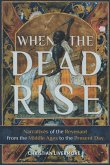Modern theoretical approaches throw new light on the concepts of face and faciality in the Roman de la Rose and other French texts from the Middle Ages.
In medieval French literature, faces feature heavily as markers of identity, mood, class, status, and even humanity. The information that they convey can be strategically concealed and revealed, but they are always understood to be legible.
This book explores the face as a medieval literary motif and as a modern phenomenon, charting its limits and interrogating the idea of face as a universal signifier. It examines what happens when faces are not legible, when they are found on non-human surfaces, and when they migrate across the human body. It looks at faciality in a series of texts from the twelfth and thirteenth centuries, moving from Arthurian tales, through the Roman de la Rose to the fabliaux, as well as examining fourteenth-century manuscripts in which faces appear as disembodied doodles. Reading these texts in conjunction with twentieth-century theories of face and faciality, and considering the ideas behind twenty-first-century face recognition technology, this book argues that faces in the popular imagination tell us less about identity than they do about how we understand and interact with the world around us.
In medieval French literature, faces feature heavily as markers of identity, mood, class, status, and even humanity. The information that they convey can be strategically concealed and revealed, but they are always understood to be legible.
This book explores the face as a medieval literary motif and as a modern phenomenon, charting its limits and interrogating the idea of face as a universal signifier. It examines what happens when faces are not legible, when they are found on non-human surfaces, and when they migrate across the human body. It looks at faciality in a series of texts from the twelfth and thirteenth centuries, moving from Arthurian tales, through the Roman de la Rose to the fabliaux, as well as examining fourteenth-century manuscripts in which faces appear as disembodied doodles. Reading these texts in conjunction with twentieth-century theories of face and faciality, and considering the ideas behind twenty-first-century face recognition technology, this book argues that faces in the popular imagination tell us less about identity than they do about how we understand and interact with the world around us.
Dieser Download kann aus rechtlichen Gründen nur mit Rechnungsadresse in A, D ausgeliefert werden.









